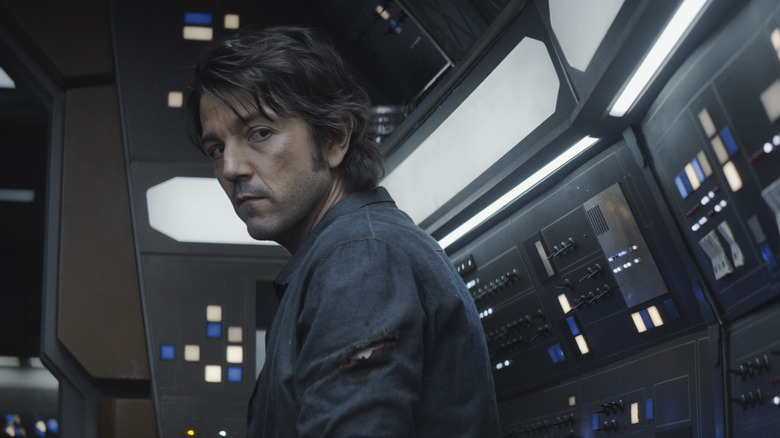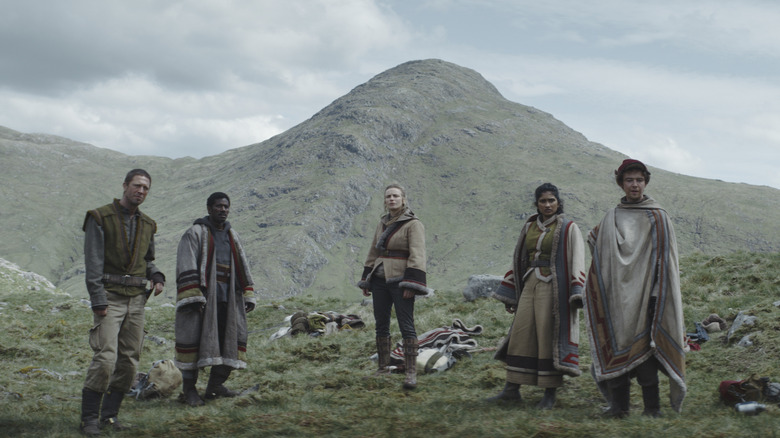Andor Episode 5 Reveals The Emotional And Physical Pains Of Being A Rebel
This post contains spoilers for the latest episode of "Andor."
"Rebellions are built on hope." That's how "Rogue One: A Star Wars Story" sold us on its much more grounded perspective on the Galactic Civil War back in 2016, putting the "war" in "Star Wars" in a way we've never seen before ... all while still upholding the franchise's innate sense of grand, romantic heroism. Now, almost six years later, "Andor" has arrived on the scene to bend our perspective of the mythic struggle against the Empire even further — almost to its breaking point, in fact.
As of this latest episode of "Andor," the series has gone well out of its way to recontextualize the Rebellion as less of an idealistic stance against fascism (although it certainly is that, too, as shown by the philosophical passion of the young, scholarly soldier Nemik) and more of a necessary response to trauma inflicted by the Imperial war machine. Cassian Andor (Diego Luna) has been recruited to the cause out of a mix of anger, the promise of credits, and the desperate need for an escape, but each and every member of his newfound crew — to say nothing of the many other characters we've encountered throughout the series — have their own deeply-held reasons for why they've come to oppose the Empire. The one thing each and every Rebel has in common, however, is the tremendous personal cost that led them to where they are.
If rebellions are built on hope, then "Andor" suggests that hope can only be born from the pain and scars of its individual rebels.
Putting a face on the Rebellion
Wars may be remembered for their glorious heroes and dastardly villains, but they're always won or lost by the faceless soldiers that live and die in anonymity. That was one of the main lessons behind "Rogue One" and it rings just as true in "Andor." The key, however, comes down to how each individual responds to the exhaustive, demoralizing, and downright fraught circumstances of fighting against their oppressors.
Episode five of "Andor" might seem somewhat scattered and unfocused at first blush, but the idea of the fight against the Empire taking an individual toll on everyone links each otherwise disparate storyline.
The main storyline sees lone wolf Andor almost come to blows repeatedly with the cynical, tattooed Arvel Skeen (Ebon Moss-Bachrach) while bickering over how to function as a structured unit. The two share a similar past history with the Empire's authoritarianism, but it takes an even more personal story of grief and loss in one of the episode's best scenes to finally break through Andor's prickly facade. Elsewhere, we learn that the Imperial-turned-Rebel Lieutenant Gorn (Sule Rimi) has downright mundane (though no less painful) reasons for turning his back on the Empire — romancing a local, getting demoted, losing his love, and finally growing disaffected enough to sabotage the system from within. Even Luthen (Stellan Skarsgård) is feeling the strain of working in the shadows for the cause, turning into a paranoid wreck as he anxiously awaits updates on the upcoming heist, while Mon Mothma (Genevieve O'Reilly) is confronted by the reality that she's placed the nascent Rebellion ahead of her relationships with her husband and daughter.
Vengeance, justice, and commitment to the cause make for great rallying cries and inspirational speeches. "Andor" digs beneath the surface of those platitudes, however, and shows just how much being a Rebel truly costs.

